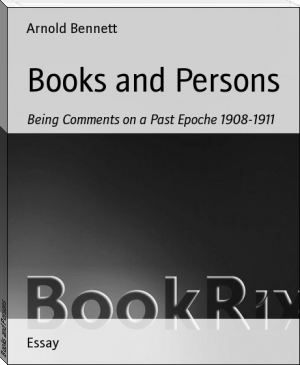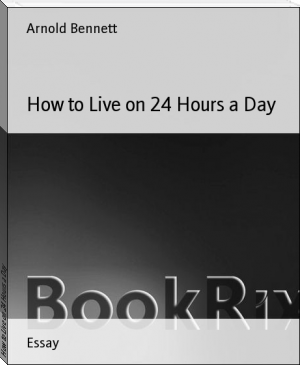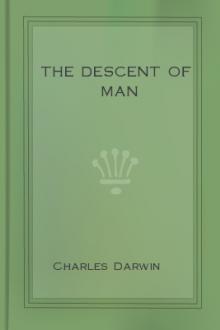Books and Persons - Arnold Bennett (phonics readers .TXT) 📗

- Author: Arnold Bennett
Book online «Books and Persons - Arnold Bennett (phonics readers .TXT) 📗». Author Arnold Bennett
on the subject of literature he was the most learned man in Britain. Unfortunately, he was quite bereft of original taste. The root of the matter was not in him. The frowning structure of his vast knowledge overawed many people, but it never overawed an artist--unless the artist was excessively young and naive. A man may heap up facts and facts on a given topic, and assort and label them, and have the trick of producing any particular fact at an instant's notice, and yet, despite all his efforts and honest toil, rest hopelessly among the profane. Churton Collins was such a man. He had no artistic feeling. Apart from the display of learning, which is always pleasant to the man of letters, his essays were arid and tedious. I never heard him lecture, but should imagine that he was an ideal University Extension lecturer. I do not mean this to be in the least complimentary to him as a critic. His book, "Illustrations Tennyson," was an entirely sterile exercise proving on every page that the author had no real perceptions about literature. It simply made creative artists laugh. They knew. His more recent book on modern tendencies displayed in an acute degree the characteristic inability of the typical professor to toddle alone when released from the leading-strings of tradition.
* * * * *
I fear that most of our professors are in a similar fix. There is Professor George Saintsbury, a regular Albert Memorial of learning. In my pensive moments I have sometimes yearned to know as many facts about literature as Professor Saintsbury knows, though he did once, I am told, state that "Wuthering Heights" was written by Charlotte. (That must have been a sadly shocking day for Mr. Clement Shorter!) I have found his Liebig "History of French Literature" very useful; it has never failed to inform me what I ought to think about the giants of the past. More important, Professor Saintsbury's critical introductions to the whole series of Dent's English edition of Balzac are startlingly just. Over and over again he hits the nail on the head and spares his finger. I have never understood by what magic he came to accomplish these prefaces. For the root of the matter is no more in Professor Saintsbury than it was in Churton Collins. He has not comprehended what he was talking about. The proof--his style and his occasional pronouncements on questions as to which he has been quite free to make up his mind all by himself!
* * * * *
I remember one evening discussing the talents of a certain orchestral conductor, who also played the violin. I was talking to a member of his orchestra, a very genuine artist. We agreed that he had conducted badly; but, I said in his defence, "Anyhow his intentions are good. You must admit that he has a feeling for music." "My dear fellow," exclaimed the bandsman pettishly, "no one who had any feeling for music could possibly stand the d----d row that that chap makes on the fiddle." I was silenced. I recall this episode in connexion with Professor Saintsbury. No one who had any feeling for literature could possibly put down the ---- style that Professor Saintsbury commits. His pen could not be brought to write it. Professor Saintsbury may be as loudly positive as he likes--his style is always quietly whispering: "Don't listen." As to his modern judgments--well for their own sakes professors of literature ought to bind themselves by oaths never to say anything about any author who was not safely dead twenty years before they were born. Such an ordinance would at any rate ensure their dignity.
* * * * *
Yet another example is Professor Walter Raleigh. Fifty per cent. of you will leap up and say that I am being perverse. But I am not. It has been demonstrated to me satisfactorily, by contact with Liverpool people, that Professor Raleigh's personal influence at that university in certain ways made for righteousness. Nevertheless, Professor Raleigh has himself demonstrated to me that, wherever the root of the matter may be, it is not in _him_. One must remember that he is young, and that his underived opinions are therefore less likely to clash with the authoritative opinions of living creative artists on their contemporaries and predecessors than if he were of the same generation as the Collinses and the Saintsburys. But wait a few years. Wait until something genuinely new and original comes along and you will see what you will see. If he wished not to ruin his reputation among artists, among people who really create things, he ought not to have published his books on "Style" and on "Shakespere." He ought to have burnt them. For they are as hollow as a drum and as unoriginal as a bride-cake: nothing but vacuity with an icing of phrases. I am brought back again to the anecdote of the musician. No one who had the least glimmering of an individual vision of what style truly is could possibly have tolerated the too fearfully ingenious mess of words that Professor Raleigh courageously calls a book on "Style." The whole thing is a flagrant contradiction of every notion of style. It may not be generally known (and I do not state it as a truth) that Professor Raleigh is a distant connexion of the celebrated family of Pains, pyrotechnicians. I would begin to go to the Empire again if I could see on the programme: "10.20. Professor Raleigh, in his unique prestidigitatory performance with words." Yes, I would stroll once more into the hallowed Promenade to see that. It would be amusing. But it would have no connexion with literature.
MRS. HUMPHRY WARD'S HEROINES
[_3 Oct. '08_]
It was the commercial genius of Mr. Hall Caine that invented the idea of publishing important novels during the "off" season. Miss Marie Corelli, by a sure instinct, followed suit. And now all sorts of stars, from genuine artists to mere successful artisans, take care to publish in the off season. Thus within the last few weeks we have had novels from Eden Phillpotts, Miss Beatrice Harraden, Anthony Hope, Mrs. Humphry Ward, and Miss Marie Corelli. At this rate the autumn will soon become the slack time; August will burn and throb with a six-shilling activity; publishers' clerks will form a union; and the Rt. Hon. W.F.D. Smith, M.P., who has always opposed an eight hours day, will bring in a Bill for an eight months year.
* * * * *
That a considerable social importance still attaches to the publication of a novel by Mrs. Humphry Ward may be judged from the fact that the _Manchester Guardian_ specially reviewed the book on its leader page. This strange phenomenon deserves to be studied, because the _Manchester Guardian_'s reviewing easily surpasses that of any other daily paper, except, possibly, the _Times_ in its Literary Supplement. The _Guardian_ relies on mere, sheer intellectual power, and as a rule it does not respect persons. Its theatrical critics, for example, take joy in speaking the exact truth--never whispered in London--concerning the mandarins of the stage. Now it is remarkable that the only strictly first-class morning daily in these isles should have printed the _Guardian_'s review of "Diana Mallory" (signed "B.S."); for the article respected persons. I do not object to Mrs. Humphry Ward being reviewed with splendid prominence. I am quite willing to concede that a new book from her constitutes the matter of a piece of news, since it undoubtedly interests a large number of respectable and correct persons. A novel by Miss Marie Corelli, however, constitutes the matter of a greater piece of news; yet I have seen no review of "Holy Orders," even in a corner, in the _Guardian_. Surely the _Guardian_ was not prevented from dealing faithfully with "Holy Orders" by the fact that it received no review copy, or by the fact that Miss Corelli desired no review. Its news department in general is conducted without reference to the desires of Miss Marie Corelli, and it does not usually boggle at an expenditure of four-and-sixpence. Why, then, Mrs. Humphry Ward being reviewed specially, is not Miss Marie Corelli reviewed specially? If the answer be that Mrs. Humphry Ward's novels are better, as literature, than Miss Corelli's, I submit that the answer is insufficient, and lacking in Manchester sincerity.
* * * * *
Let me duly respect Mrs. Humphry Ward. She knows her business. She is an expert in narrative. She can dress up even the silliest incidents of sentimental fiction--such as that in which the virgin heroine, in company with a young man, misses the last train home (see "Helbeck of Bannisdale")--in a costume of plausibility. She is a conscientious worker. She does not make a spectacle of herself in illustrated interviews. Even in agitating against votes for women she can maintain her dignity. (She would be an ideal President of the Authors' Society.) But, then, similar remarks apply, say, to Mr. W.E. Norris. Mr. W.E. Norris is as accomplished an expert as Mrs. Humphry Ward. He is in possession of a much better style. He has humour. He is much more true to life. He has never compromised the dignity of his vocation. Nevertheless, the prospect of the _Guardian_ reviewing Mr. W.E. Norris on its leader page is remote, for the reason that though he pleases respectable and correct persons, he does not please nearly so many respectable and correct persons as does Mrs. Humphry Ward. If anybody has a right to the leader page of our unique daily, Mrs. Humphry Ward is that body. My objection to the phenomenon is that the _Guardian_ falsified its item of news. It deliberately gave the impression that a serious work of art had appeared in "Diana Mallory." It ought to have known better. It did know better. If our unique daily is to yield to the snobbishness which ranks Mrs. Humphry Ward among genuine artists, where among dailies are we to look for the shadow of a great rock?
* * * * *
Mrs. Humphry Ward's novels are praise-worthy as being sincerely and skilfully done, but they are not works of art. They are possibly the best stuff now being swallowed by the uneducated public; and they deal with the governing classes; and when you have said that you have said all. Nothing truly serious can happen in them. It is all make-believe. No real danger of the truth about life!... I should think not, indeed! The fearful quandary in which the editor of _Harper's_ found himself with "Jude the Obscure" was a lesson to all Anglo-Saxon editors for ever more! Mrs. Humphry
* * * * *
I fear that most of our professors are in a similar fix. There is Professor George Saintsbury, a regular Albert Memorial of learning. In my pensive moments I have sometimes yearned to know as many facts about literature as Professor Saintsbury knows, though he did once, I am told, state that "Wuthering Heights" was written by Charlotte. (That must have been a sadly shocking day for Mr. Clement Shorter!) I have found his Liebig "History of French Literature" very useful; it has never failed to inform me what I ought to think about the giants of the past. More important, Professor Saintsbury's critical introductions to the whole series of Dent's English edition of Balzac are startlingly just. Over and over again he hits the nail on the head and spares his finger. I have never understood by what magic he came to accomplish these prefaces. For the root of the matter is no more in Professor Saintsbury than it was in Churton Collins. He has not comprehended what he was talking about. The proof--his style and his occasional pronouncements on questions as to which he has been quite free to make up his mind all by himself!
* * * * *
I remember one evening discussing the talents of a certain orchestral conductor, who also played the violin. I was talking to a member of his orchestra, a very genuine artist. We agreed that he had conducted badly; but, I said in his defence, "Anyhow his intentions are good. You must admit that he has a feeling for music." "My dear fellow," exclaimed the bandsman pettishly, "no one who had any feeling for music could possibly stand the d----d row that that chap makes on the fiddle." I was silenced. I recall this episode in connexion with Professor Saintsbury. No one who had any feeling for literature could possibly put down the ---- style that Professor Saintsbury commits. His pen could not be brought to write it. Professor Saintsbury may be as loudly positive as he likes--his style is always quietly whispering: "Don't listen." As to his modern judgments--well for their own sakes professors of literature ought to bind themselves by oaths never to say anything about any author who was not safely dead twenty years before they were born. Such an ordinance would at any rate ensure their dignity.
* * * * *
Yet another example is Professor Walter Raleigh. Fifty per cent. of you will leap up and say that I am being perverse. But I am not. It has been demonstrated to me satisfactorily, by contact with Liverpool people, that Professor Raleigh's personal influence at that university in certain ways made for righteousness. Nevertheless, Professor Raleigh has himself demonstrated to me that, wherever the root of the matter may be, it is not in _him_. One must remember that he is young, and that his underived opinions are therefore less likely to clash with the authoritative opinions of living creative artists on their contemporaries and predecessors than if he were of the same generation as the Collinses and the Saintsburys. But wait a few years. Wait until something genuinely new and original comes along and you will see what you will see. If he wished not to ruin his reputation among artists, among people who really create things, he ought not to have published his books on "Style" and on "Shakespere." He ought to have burnt them. For they are as hollow as a drum and as unoriginal as a bride-cake: nothing but vacuity with an icing of phrases. I am brought back again to the anecdote of the musician. No one who had the least glimmering of an individual vision of what style truly is could possibly have tolerated the too fearfully ingenious mess of words that Professor Raleigh courageously calls a book on "Style." The whole thing is a flagrant contradiction of every notion of style. It may not be generally known (and I do not state it as a truth) that Professor Raleigh is a distant connexion of the celebrated family of Pains, pyrotechnicians. I would begin to go to the Empire again if I could see on the programme: "10.20. Professor Raleigh, in his unique prestidigitatory performance with words." Yes, I would stroll once more into the hallowed Promenade to see that. It would be amusing. But it would have no connexion with literature.
MRS. HUMPHRY WARD'S HEROINES
[_3 Oct. '08_]
It was the commercial genius of Mr. Hall Caine that invented the idea of publishing important novels during the "off" season. Miss Marie Corelli, by a sure instinct, followed suit. And now all sorts of stars, from genuine artists to mere successful artisans, take care to publish in the off season. Thus within the last few weeks we have had novels from Eden Phillpotts, Miss Beatrice Harraden, Anthony Hope, Mrs. Humphry Ward, and Miss Marie Corelli. At this rate the autumn will soon become the slack time; August will burn and throb with a six-shilling activity; publishers' clerks will form a union; and the Rt. Hon. W.F.D. Smith, M.P., who has always opposed an eight hours day, will bring in a Bill for an eight months year.
* * * * *
That a considerable social importance still attaches to the publication of a novel by Mrs. Humphry Ward may be judged from the fact that the _Manchester Guardian_ specially reviewed the book on its leader page. This strange phenomenon deserves to be studied, because the _Manchester Guardian_'s reviewing easily surpasses that of any other daily paper, except, possibly, the _Times_ in its Literary Supplement. The _Guardian_ relies on mere, sheer intellectual power, and as a rule it does not respect persons. Its theatrical critics, for example, take joy in speaking the exact truth--never whispered in London--concerning the mandarins of the stage. Now it is remarkable that the only strictly first-class morning daily in these isles should have printed the _Guardian_'s review of "Diana Mallory" (signed "B.S."); for the article respected persons. I do not object to Mrs. Humphry Ward being reviewed with splendid prominence. I am quite willing to concede that a new book from her constitutes the matter of a piece of news, since it undoubtedly interests a large number of respectable and correct persons. A novel by Miss Marie Corelli, however, constitutes the matter of a greater piece of news; yet I have seen no review of "Holy Orders," even in a corner, in the _Guardian_. Surely the _Guardian_ was not prevented from dealing faithfully with "Holy Orders" by the fact that it received no review copy, or by the fact that Miss Corelli desired no review. Its news department in general is conducted without reference to the desires of Miss Marie Corelli, and it does not usually boggle at an expenditure of four-and-sixpence. Why, then, Mrs. Humphry Ward being reviewed specially, is not Miss Marie Corelli reviewed specially? If the answer be that Mrs. Humphry Ward's novels are better, as literature, than Miss Corelli's, I submit that the answer is insufficient, and lacking in Manchester sincerity.
* * * * *
Let me duly respect Mrs. Humphry Ward. She knows her business. She is an expert in narrative. She can dress up even the silliest incidents of sentimental fiction--such as that in which the virgin heroine, in company with a young man, misses the last train home (see "Helbeck of Bannisdale")--in a costume of plausibility. She is a conscientious worker. She does not make a spectacle of herself in illustrated interviews. Even in agitating against votes for women she can maintain her dignity. (She would be an ideal President of the Authors' Society.) But, then, similar remarks apply, say, to Mr. W.E. Norris. Mr. W.E. Norris is as accomplished an expert as Mrs. Humphry Ward. He is in possession of a much better style. He has humour. He is much more true to life. He has never compromised the dignity of his vocation. Nevertheless, the prospect of the _Guardian_ reviewing Mr. W.E. Norris on its leader page is remote, for the reason that though he pleases respectable and correct persons, he does not please nearly so many respectable and correct persons as does Mrs. Humphry Ward. If anybody has a right to the leader page of our unique daily, Mrs. Humphry Ward is that body. My objection to the phenomenon is that the _Guardian_ falsified its item of news. It deliberately gave the impression that a serious work of art had appeared in "Diana Mallory." It ought to have known better. It did know better. If our unique daily is to yield to the snobbishness which ranks Mrs. Humphry Ward among genuine artists, where among dailies are we to look for the shadow of a great rock?
* * * * *
Mrs. Humphry Ward's novels are praise-worthy as being sincerely and skilfully done, but they are not works of art. They are possibly the best stuff now being swallowed by the uneducated public; and they deal with the governing classes; and when you have said that you have said all. Nothing truly serious can happen in them. It is all make-believe. No real danger of the truth about life!... I should think not, indeed! The fearful quandary in which the editor of _Harper's_ found himself with "Jude the Obscure" was a lesson to all Anglo-Saxon editors for ever more! Mrs. Humphry
Free e-book «Books and Persons - Arnold Bennett (phonics readers .TXT) 📗» - read online now
Similar e-books:





Comments (0)